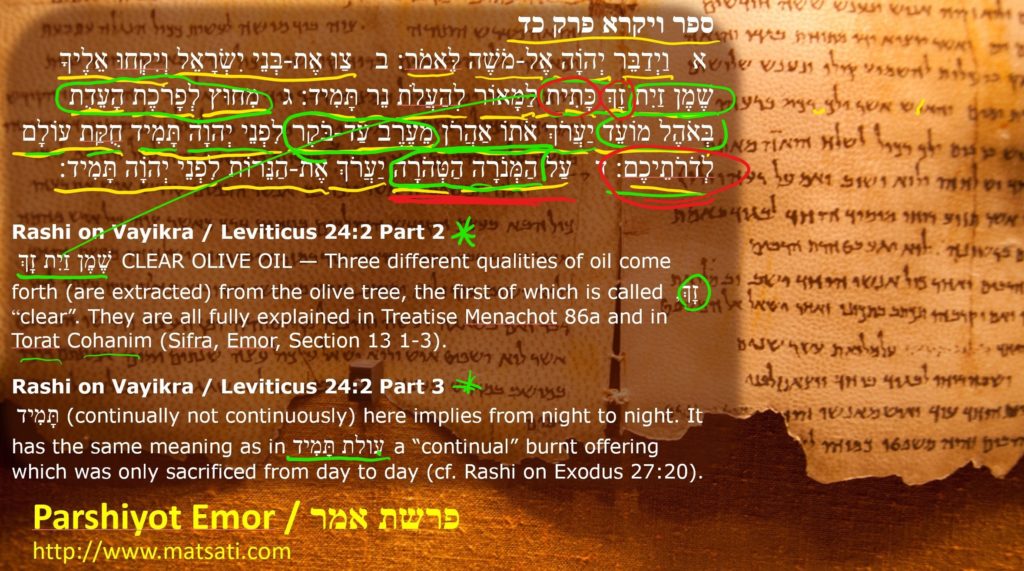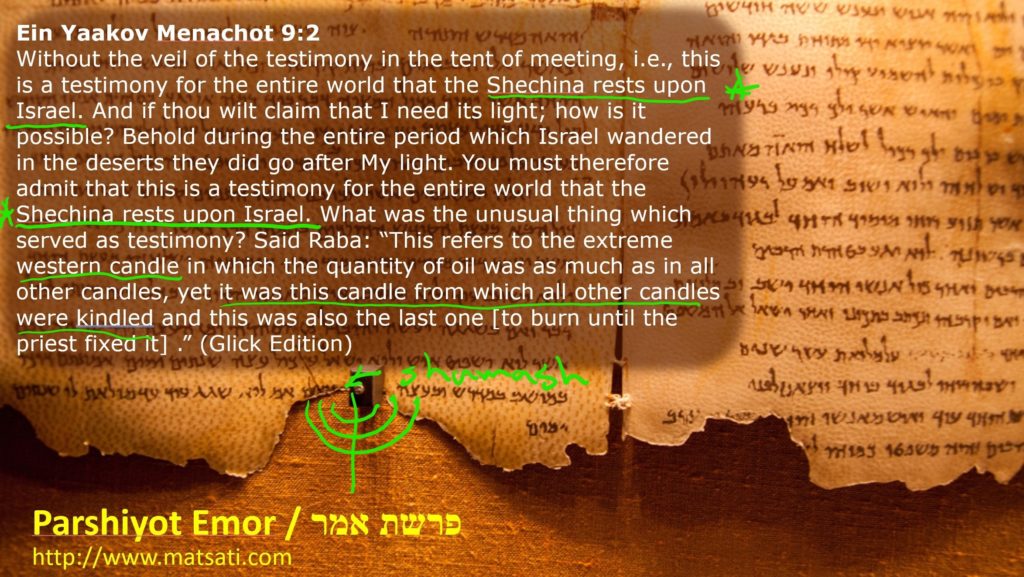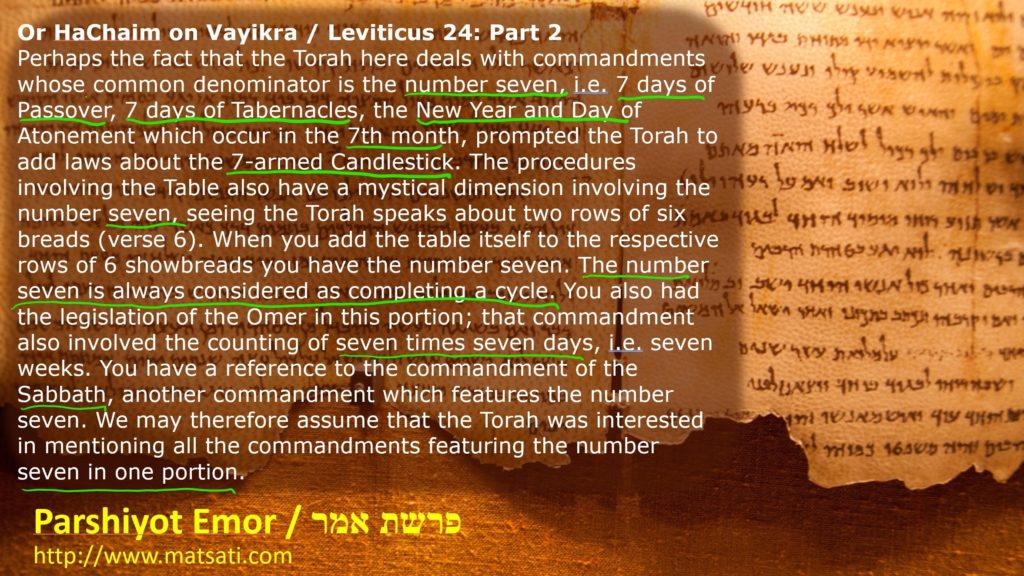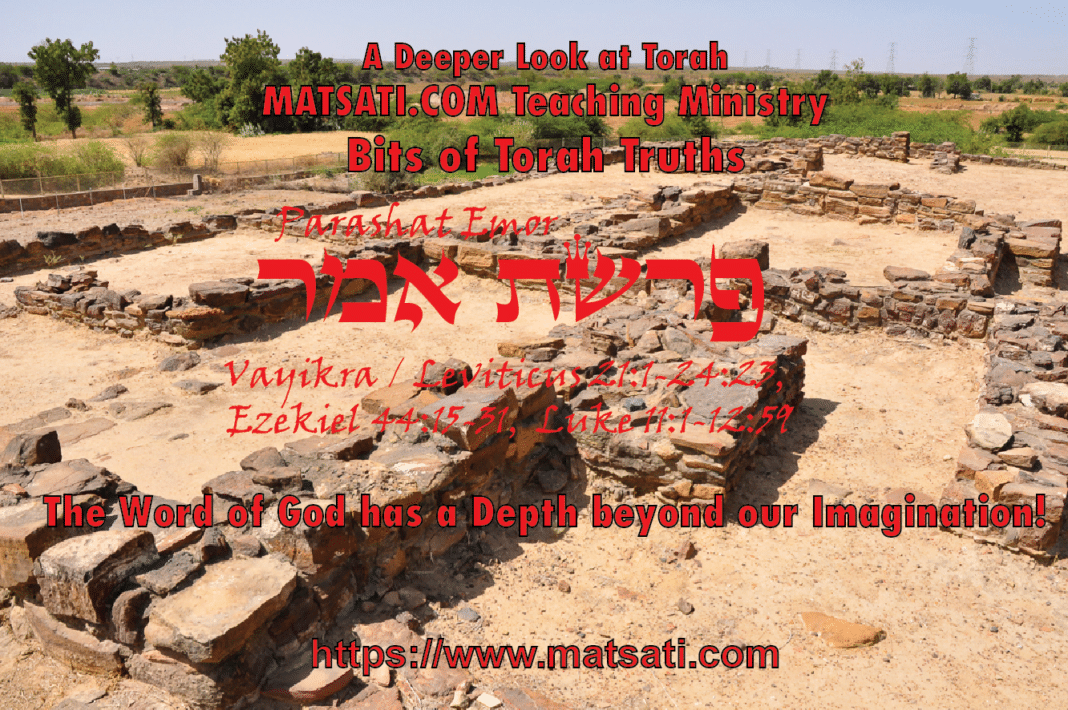In this week’s Torah portion we read about the regulations concerning the Priests (Vayikra / Leviticus 21), the regulations on who is approved to be physically fit for service before the Lord as physical defects disqualified one from service (Vayikra / Leviticus 22:1-16).How the animals being brought to sacrifice are to be flawless (Vayikra / Leviticus 22:17-33), and the Torat (instructions) on the Moedim (Appointed times, festivals, Vayikra / Leviticus 23:1-25), and then instructions on Yom Kippur (Day of Atonement, Vayikra / Leviticus 23:26-44). Then there are instructions on the Lamp and the Bread of the Presence in the Sanctuary (Vayikra / Leviticus 24:1-16), and the command an “eye for an eye; tooth for a tooth” meaning the punishment must meet the crime, as in those days, a man could be prosecuted using differing measuring lines, and leading to injustice (Vayikra / Leviticus 24:17-23). The verses we are looking at for this week are from Vayikra / Leviticus 24:1-4, א וַיְדַבֵּר יְהוָֹה אֶל-מֹשֶׁה לֵּאמֹר: ב צַו אֶת-בְּנֵי יִשְֹרָאֵל וְיִקְחוּ אֵלֶיךָ שֶׁמֶן זַיִת זָךְ כָּתִית לַמָּאוֹר לְהַעֲלֹת נֵר תָּמִיד: ג מִחוּץ לְפָרֹכֶת הָעֵדֻת בְּאֹהֶל מוֹעֵד יַעֲרֹךְ אֹתוֹ אַהֲרֹן מֵעֶרֶב עַד-בֹּקֶר לִפְנֵי יְהוָֹה תָּמִיד חֻקַּת עוֹלָם לְדֹרֹתֵיכֶם: ד עַל הַמְּנֹרָה הַטְּהֹרָה יַעֲרֹךְ אֶת-הַנֵּרוֹת לִפְנֵי יְהוָֹה תָּמִיד: 24:1 Then the Lord spoke to Moses, saying, 24:2 ‘Command the sons of Israel that they bring to you clear oil from beaten olives for the light, to make a lamp burn continually. 24:3 ‘Outside the veil of testimony in the tent of meeting, Aaron shall keep it in order from evening to morning before the Lord continually; it shall be a perpetual statute throughout your generations. 24:4 ‘He shall keep the lamps in order on the pure gold lampstand before the Lord continually. (NASB) The rabbis interpret these Scriptures by the way the text is written, מִחוּץ לְפָרֹכֶת הָעֵדֻת בְּאֹהֶל מוֹעֵד “outside the curtain of the testimony of the tent of meeting” saying this suggests that the position of the Menorah was closer to the dividing curtain as opposed to the entrance of the Mishkhan. (Chizkuni, Vayikra / Leviticus 24:3 Part 1) This reminds us how drawing nearer to the sacred place of God causes the light of God to shine brighter in our lives. The last part of the sentence in 24:3 states, יַעֲרֹךְ אֹתוֹ אַהֲרֹן מֵעֶרֶב עַד-בֹּקֶר לִפְנֵי יְהוָֹה תָּמִיד חֻקַּת עוֹלָם לְדֹרֹתֵיכֶם “Aaron shall keep it in order from evening to morning before the Lord continually.” What is interesting is the words מֵעֶרֶב עַד-בֹּקֶר “from evening to morning.” What is surprising about this particular phrase is how there are no windows in the Mishkhan (Tabernacle), so there would always be darkness in the Mishkhan, and yet we are told that Aaron is to only keep the lamp burning from morning to evening? Would the lamp not need to burn 24 hrs in order to provide light? We also find in several places in the Torah the command on how to prepare the oil, שֶׁמֶן זַיִת זָךְ כָּתִית “olive oil, clear, beaten” as we find in Shemot / Exodus 27:20, the oil was to be pressed in a mortar and pestle and this was to be used in the unalloyed lamp stand. The lamp stand was made of pure gold. Rashi states the following concerning these things:

Rashi on Vayikra / Leviticus 24:2 Part 2
שמן זית זך CLEAR OLIVE OIL — Three different qualities of oil come forth (are extracted) from the olive tree, the first of which is called זך, “clear”. They are all fully explained in Treatise Menachot 86a and in Torat Cohanim (Sifra, Emor, Section 13 1-3).
Rashi on Vayikra / Leviticus 24:2 Part 3
תמיד (continually not continuously) here implies from night to night. It has the same meaning as in עולת תמיד a “continual” burnt offering which was only sacrificed from day to day (cf. Rashi on Exodus 27:20).
Fascinating how these things Rashi connects to the Olat Tamid, this was the opening and closing (first and last) sacrifice of the day, an olah korban, a lamb that sanctified the altar, and upon which all of the sacrifices for the day were laid upon. The Olat Tamid sacrifice is representative of Yeshua the Messiah as the lamb of God. Rashi also speaks of how the oil was to be pure and its preparation was to be in a particular way, and the lamp which was made of pure gold was to be kept burning 24 hrs a day. In addition to these things, the shemen (oil) can also symbolize a consecration, or a special setting apart for a holy purpose. Shemen may also refer to the Holy Spirit abiding in a person, or it can also refer to God’s presence, through His Spirit, to motivate, guide or lead a person. Examples are when Samuel anointed Saul with oil (1 Samuel 10:1) and Saul received the Holy Spirit (10:6-9). Later, Samuel anointed David with oil, and at that moment, David received the Holy Spirit (1 Samuel 16:13). In Tehillim / Psalm 89:20, it is emphasized that God had found His servant David, whom He anointed with His holy oil. (Compare also Tehillim / Psalm 23:5). We are also reminded of Acts 5:32, which tells us that God gives His Holy Spirit only to those who are already obeying Him to a degree. We also read according to Isaiah 61:3 about the anointed one of God giving people the “oil of joy” (שֶׁ֤מֶן שָׂשׂוֹן֙) and various references to the Holy Spirit as a Spirit of joy in the NT (see Acts 13:52 and Galatians 5:22). We find all of these concepts and more fully developed as we read through the NT text. When we take all of these things together, the oil in the tabernacle, along with the parallel of oil to the holy spirit, and light to the righteousness of God, the command to keep the light burning 24/7 and how the Menorah was placed in a position closer לְפָרֹכֶת הָעֵדֻת to the curtain of the testimony, these things reminds us how we are to be continually filled with the Holy Spirit of God, to always be walking in His ways of righteousness and truth, and to being His light, His truth unto the world! Notice also how this is in the context of being an eternal statute for all generations.
The verses we are looking at for this week are from Vayikra / Leviticus 24:1-22.
ספר ויקרא פרק כד
א וַיְדַבֵּר יְהוָֹה אֶל-מֹשֶׁה לֵּאמֹר: ב צַו אֶת-בְּנֵי יִשְֹרָאֵל וְיִקְחוּ אֵלֶיךָ שֶׁמֶן זַיִת זָךְ כָּתִית לַמָּאוֹר לְהַעֲלֹת נֵר תָּמִיד: ג מִחוּץ לְפָרֹכֶת הָעֵדֻת בְּאֹהֶל מוֹעֵד יַעֲרֹךְ אֹתוֹ אַהֲרֹן מֵעֶרֶב עַד-בֹּקֶר לִפְנֵי יְהוָֹה תָּמִיד חֻקַּת עוֹלָם לְדֹרֹתֵיכֶם: ד עַל הַמְּנֹרָה הַטְּהֹרָה יַעֲרֹךְ אֶת-הַנֵּרוֹת לִפְנֵי יְהוָֹה תָּמִיד: פ ה וְלָקַחְתָּ סֹלֶת וְאָפִיתָ אֹתָהּ שְׁתֵּים עֶשְֹרֵה חַלּוֹת שְׁנֵי עֶשְֹרֹנִים יִהְיֶה הַחַלָּה הָאֶחָת: ו וְשַֹמְתָּ אוֹתָם שְׁתַּיִם מַעֲרָכוֹת שֵׁשׁ הַמַּעֲרָכֶת עַל הַשֻּׁלְחָן הַטָּהֹר לִפְנֵי יְהוָֹה: ז וְנָתַתָּ עַל-הַמַּעֲרֶכֶת לְבֹנָה זַכָּה וְהָיְתָה לַלֶּחֶם לְאַזְכָּרָה אִשֶּׁה לַיהוָֹה: ח בְּיוֹם הַשַּׁבָּת בְּיוֹם הַשַּׁבָּת יַעַרְכֶנּוּ לִפְנֵי יְהוָֹה תָּמִיד מֵאֵת בְּנֵי-יִשְֹרָאֵל בְּרִית עוֹלָם: ט וְהָיְתָה לְאַהֲרֹן וּלְבָנָיו וַאֲכָלֻהוּ בְּמָקוֹם קָדשׁ כִּי קֹדֶשׁ קָדָשִׁים הוּא לוֹ מֵאִשֵּׁי יְהוָֹה חָק-עוֹלָם: ס י וַיֵּצֵא בֶּן-אִשָּׁה יִשְֹרְאֵלִית וְהוּא בֶּן-אִישׁ מִצְרִי בְּתוֹךְ בְּנֵי יִשְֹרָאֵל וַיִּנָּצוּ בַּמַּחֲנֶה בֶּן הַיִּשְֹרְאֵלִית וְאִישׁ הַיִּשְֹרְאֵלִי: יא וַיִּקֹּב בֶּן-הָאִשָּׁה הַיִּשְֹרְאֵלִית אֶת-הַשֵּׁם וַיְקַלֵּל וַיָּבִיאוּ אֹתוֹ אֶל-מֹשֶׁה וְשֵׁם אִמּוֹ שְׁלֹמִית בַּת-דִּבְרִי לְמַטֵּה-דָן: יב וַיַּנִּיחֻהוּ בַּמִּשְׁמָר לִפְרשׁ לָהֶם עַל-פִּי יְהוָֹה: פ יג וַיְדַבֵּר יְהוָֹה אֶל-מֹשֶׁה לֵּאמֹר: יד הוֹצֵא אֶת-הַמְקַלֵּל אֶל-מִחוּץ לַמַּחֲנֶה וְסָמְכוּ כָל-הַשֹּׁמְעִים אֶת-יְדֵיהֶם עַל-רֹאשׁוֹ וְרָגְמוּ אֹתוֹ כָּל-הָעֵדָה: טו וְאֶל-בְּנֵי יִשְֹרָאֵל תְּדַבֵּר לֵאמֹר אִישׁ אִישׁ כִּי-יְקַלֵּל אֱלֹהָיו וְנָשָֹא חֶטְאוֹ: טז וְנֹקֵב שֵׁם-יְהוָֹה מוֹת יוּמָת רָגוֹם יִרְגְּמוּ-בוֹ כָּל-הָעֵדָה כַּגֵּר כָּאֶזְרָח בְּנָקְבוֹ-שֵׁם יוּמָת: יז וְאִישׁ כִּי יַכֶּה כָּל-נֶפֶשׁ אָדָם מוֹת יוּמָת: יח וּמַכֵּה נֶפֶשׁ-בְּהֵמָה יְשַׁלְּמֶנָּה נֶפֶשׁ תַּחַת נָפֶשׁ: יט וְאִישׁ כִּי-יִתֵּן מוּם בַּעֲמִיתוֹ כַּאֲשֶׁר עָשָֹה כֵּן יֵעָשֶֹה לּוֹ: כ שֶׁבֶר תַּחַת שֶׁבֶר עַיִן תַּחַת עַיִן שֵׁן תַּחַת שֵׁן כַּאֲשֶׁר יִתֵּן מוּם בָּאָדָם כֵּן יִנָּתֶן בּוֹ: [מפטיר] כא וּמַכֵּה בְהֵמָה יְשַׁלְּמֶנָּה וּמַכֵּה אָדָם יוּמָת: כב מִשְׁפַּט אֶחָד יִהְיֶה לָכֶם כַּגֵּר כָּאֶזְרָח יִהְיֶה כִּי אֲנִי יְהוָֹה אֱלֹהֵיכֶם:
Vayikra / Leviticus 24:1-22
24:1 Then the Lord spoke to Moses, saying, 24:2 ‘Command the sons of Israel that they bring to you clear oil from beaten olives for the light, to make a lamp burn continually. 24:3 ‘Outside the veil of testimony in the tent of meeting, Aaron shall keep it in order from evening to morning before the Lord continually; it shall be a perpetual statute throughout your generations. 24:4 ‘He shall keep the lamps in order on the pure gold lampstand before the Lord continually. 24:5 ‘Then you shall take fine flour and bake twelve cakes with it; two-tenths of an ephah shall be in each cake. 24:6 ‘you shall set them in two rows, six to a row, on the pure gold table before the Lord. 24:7 ‘You shall put pure frankincense on each row that it may be a memorial portion for the bread, even an offering by fire to the Lord. 24:8 ‘Every sabbath day he shall set it in order before the Lord continually; it is an everlasting covenant for the sons of Israel. 24:9 ‘It shall be for Aaron and his sons, and they shall eat it in a holy place; for it is most holy to him from the Lord’s offerings by fire, his portion forever.’ 24:10 Now the son of an Israelite woman, whose father was an Egyptian, went out among the sons of Israel; and the Israelite woman’s son and a man of Israel struggled with each other in the camp. 24:11 The son of the Israelite woman blasphemed the Name and cursed. So they brought him to Moses. (Now his mother’s name was Shelomith, the daughter of Dibri, of the tribe of Dan.) 24:12 They put him in custody so that the command of the Lord might be made clear to them. 24:13 Then the Lord spoke to Moses, saying, 24:14 ‘Bring the one who has cursed outside the camp, and let all who heard him lay their hands on his head; then let all the congregation stone him. 24:15 ‘You shall speak to the sons of Israel, saying, ‘If anyone curses his God, then he will bear his sin. 24:16 ‘Moreover, the one who blasphemes the name of the Lord shall surely be put to death; all the congregation shall certainly stone him. The alien as well as the native, when he blasphemes the Name, shall be put to death. 24:17 ‘If a man takes the life of any human being, he shall surely be put to death. 24:18 ‘The one who takes the life of an animal shall make it good, life for life. 24:19 ‘If a man injures his neighbor, just as he has done, so it shall be done to him: 24:20 fracture for fracture, eye for eye, tooth for tooth; just as he has injured a man, so it shall be inflicted on him. 24:21 ‘Thus the one who kills an animal shall make it good, but the one who kills a man shall be put to death. 24:22 ‘There shall be one standard for you; it shall be for the stranger as well as the native, for I am the Lord your God.’ (NASB)
We note something here, in Vayikra / Leviticus 24:3 we read how this is to be an everlasting חוק (statute or law) for all generations (חֻקַּת עוֹלָם לְדֹרֹתֵיכֶם). The rabbis derive from this as referring also to all of the mitzvot (commands) in the Torah as being for all generations as well. “Rabbi. Yishmael says: Since we find unqualified commands in the Torah, and one of them was qualified as being for present performance and for future generations, we derive the same for all the mitzvoth in the Torah.” (Sifrei Bamidbar 1:2) This interpretation is consistent with the prophets that speak of God’s Word being eternal (see Isaiah 40:8 and elsewhere). The Torah defines righteousness, holiness, and truth, and these things are characteristic of who God is, this is why His Word is everlasting and established forever (וּדְבַר־אֱלֹהֵ֖ינוּ יָק֥וּם לְעוֹלָֽם). The Rabbis go further in their interpretations on these verses according to Ein Yaakov who states the following:

Ein Yaakov Menachot 9:2
Without the veil of the testimony in the tent of meeting, i.e., this is a testimony for the entire world that the Shechina rests upon Israel. And if thou wilt claim that I need its light; how is it possible? Behold during the entire period which Israel wandered in the deserts they did go after My light. You must therefore admit that this is a testimony for the entire world that the Shechina rests upon Israel. What was the unusual thing which served as testimony? Said Raba: “This refers to the extreme western candle in which the quantity of oil was as much as in all other candles, yet it was this candle from which all other candles were kindled and this was also the last one [to burn until the priest fixed it] .” (Glick Edition)
Notice how the Menorah and oil are said to reveal the dwelling of the glory of God upon His people. He says this is derived from the candle from which the other candles are kindled. This reminds us of the Shamash candle on the Menorah. On the first night of Hanukah, the first candle is kindled, this is the central candle, the Shamash (the servant candle). The light from the Menorah is a spiritual light because it is something that was hidden in the Mishkhan and unseen from the outside. The light was visible however from within the holy chamber and before the most holy place of sacrificial atonement. Something to note is how the light was necessary in the Mishkhan (Tabernacle) in order for the service to God to be performed. This light was also not to be used for profane purposes. These draw parallels to our lives as being sanctified by the Servant Messiah (Shamash) for the service of God, and how we are to walk in God’s ways after having been sanctified so as not to walk in the חוק of the nations. We note the spiritual connection of the central candle kindling the other candles, this is a picture of Yeshua in our lives, setting us on fire for the Lord, sanctifying us to the service of God. Just as the Menorah, its base and arms of pure gold were hammered, so too Yeshua’s arms and feet were hammered (nailed) which draws in these concepts of the suffering servant (shamash) which sets us on fire for God. Note how much spiritual meaning is derived from these verses from the Torah. Again, this is why it is so important for us to study the Torah as we are able to understand what is taught in the NT and how these things come to be derived.
ספר ויקרא פרק כד
א וַיְדַבֵּר יְהוָֹה אֶל-מֹשֶׁה לֵּאמֹר: ב צַו אֶת-בְּנֵי יִשְֹרָאֵל וְיִקְחוּ אֵלֶיךָ שֶׁמֶן זַיִת זָךְ כָּתִית לַמָּאוֹר לְהַעֲלֹת נֵר תָּמִיד: ג מִחוּץ לְפָרֹכֶת הָעֵדֻת בְּאֹהֶל מוֹעֵד יַעֲרֹךְ אֹתוֹ אַהֲרֹן מֵעֶרֶב עַד-בֹּקֶר לִפְנֵי יְהוָֹה תָּמִיד חֻקַּת עוֹלָם לְדֹרֹתֵיכֶם: ד עַל הַמְּנֹרָה הַטְּהֹרָה יַעֲרֹךְ אֶת-הַנֵּרוֹת לִפְנֵי יְהוָֹה תָּמִיד:
Vayikra / Leviticus 24:1-4
24:1 Then the Lord spoke to Moses, saying, 24:2 ‘Command the sons of Israel that they bring to you clear oil from beaten olives for the light, to make a lamp burn continually. 24:3 ‘Outside the veil of testimony in the tent of meeting, Aaron shall keep it in order from evening to morning before the Lord continually; it shall be a perpetual statute throughout your generations. 24:4 ‘He shall keep the lamps in order on the pure gold lampstand before the Lord continually. (NASB)
The oil, the light of God, His presence, the power of God in our lives, the light of the righteousness of God, and the command to keep the light burning 24/7, and how the Menorah was placed in a position closer לְפָרֹכֶת הָעֵדֻת (to the curtain of the testimony), these things reminds us how we are to be continually filled with the Holy Spirit of God, to always be walking in His ways of righteousness and truth, and to being His light, His truth unto the world! Considering all of these things, we can observe how the Rabbis draw even more connections in the Torah to these verses from Vayikra / Leviticus 24.

Or HaChaim on Vayikra / Leviticus 24: Part 2
Perhaps the fact that the Torah here deals with commandments whose common denominator is the number seven, i.e. 7 days of Passover, 7 days of Tabernacles, the New Year and Day of Atonement which occur in the 7th month, prompted the Torah to add laws about the 7-armed Candlestick. The procedures involving the Table also have a mystical dimension involving the number seven, seeing the Torah speaks about two rows of six breads (verse 6). When you add the table itself to the respective rows of 6 showbreads you have the number seven. The number seven is always considered as completing a cycle. You also had the legislation of the Omer in this portion; that commandment also involved the counting of seven times seven days, i.e. seven weeks. You have a reference to the commandment of the Sabbath, another commandment which features the number seven. We may therefore assume that the Torah was interested in mentioning all the commandments featuring the number seven in one portion.
The rabbis connect the Menorah seven golden candle sticks, the oil, and the light to the Passover, Succot, Yom Kippur, the table of the bread of the presence, and to the counting of the Omer (the time in which it took Israel to travel from Egypt to Sinai and the giving of the Torah), and the Shabbat. These things reveal to us how all of Scripture is intimately connected. In Jewish tradition, the menorah is reminiscent of the Tree of Life from the creation story. We can see according to the NT in the book of Revelation that the tree is equated with eternal life. Adam and Eve were banished from גן בעדן (Garden of Eden, Paradise), and according to Revelation 22 tells us that those who are sanctified having clean robes (i.e. made righteous) have the right to eat from it. This week’s Torah portion reveals the power of God in our lives, to sanctify us, to make us complete, and to draw us near to the holy place in the Messiah Yeshua. The presence of God resting upon His people is referring to the Gospel Message which was preached to the generation in the wilderness and further revealed to us in the Messiah Yeshua as abiding in each and every one of us, to empower us to overcome this world just as Yeshua did, leading us and guiding us in the way of righteousness for the glory of God!









